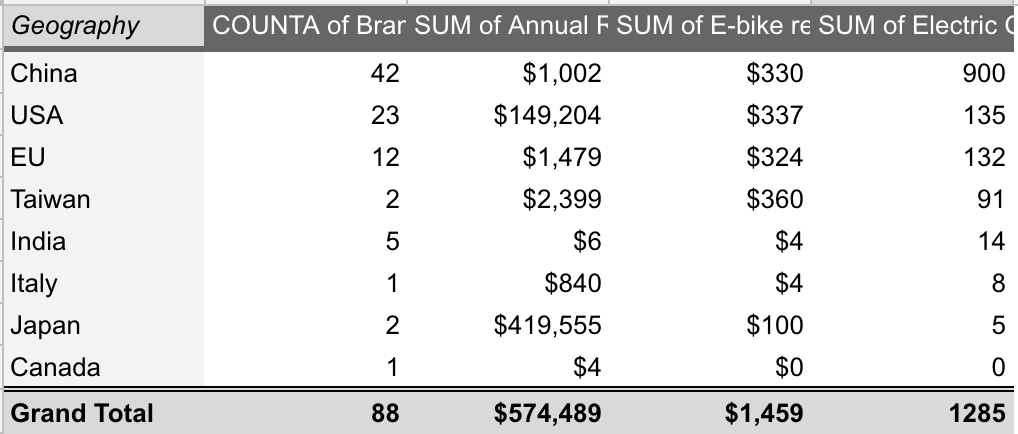Knowledge
What make electric bikes so expensive?
your pet need wa.
brand DOG Anxiety Vest
It’s a question of demographics, use cases and urbanization, combined with the timing of the market.
Demand for electric bikes is high globally.
The world has increasingly urbanized, with North America being 80%+ urban. That means that the distances between people and things have shrunk for the large majority of people. But cities are still big, too big for most people to comfortably bicycle around.
Yet, at the same time, city traffic is getting slower. More people equals more congestion. An electric bicycle, one that can be ridden on paths, bike lanes and the street shrinks urban distances to very manageable levels, flattens hills and allows people to arrive at work, school or play relatively fresh, as opposed to a hot mess.
Urban commuting and errands strongly advantage electric bikes over cars a large portion of the time, so much so that a single person might consider it instead of a car at a much lower price point, and a family might consider it instead of a second car. When you consider the price of e-bikes, they are much cheaper than cars and immune to traffic jams.
Younger people in the USA have less buying power than their parents and more things to spend it on. Gone are the days of cheap (and unsafe) cars that were easily affordable for a single-income family on a working person’s salary. And millennials want the latest phone and big data plans more than they want monthly car loans and insurance.
Electric bikes are such big business that the EU just concluded that China was dumping cheap e-bikes on the EU market in order to take control of the global market, something it’s doing in the USA as well undoubtedly. I’ve been building a model of the e-bike market entrants that’s not complete but is still very enlightening.

Mostly what’s missing are probably half of the Chinese firms, and at least in China Taiwan is considered part of China. It has at least a billion dollar industry by itself vs a smaller industry spread across the rest of the world. It’s part of China’s intended ownership of electrified transportation of the future. They want to own electric cars and bikes for the coming decades globally, as a national strategy.
That seems to counter the question, however.
An electric bike still costs more to make than a non-electric bike. You can’t just bolt $10 of parts to an existing bike and have it work or at least work well and consistently.
Typically you have to design the frame for it and ensure that cable routing is in place. Then you have to select and integrate components that don’t exist on normal bikes including a decent-sized battery, a reasonably strong motor, a controller to manage electrical flow from battery to motor and control mechanisms for the rider, whether pedal sensors or handgrip controls. This is all going to be heavier than a normal bike, so often you’ll beef up the tires a bit.
A cheap bike costs $300. A cheap e-bike costs about twice that. Seems reasonable.
But then you get into the more expensive e-bikes and ask why so much more expensive? Well, Bosch and Yamaha sell very good, very refined motors, but they cost more because they are very good, very refined and have brand recognition. Panasonic sells excellent but more expensive batteries, and the combination of batteries and power management will lead to batteries that last years vs months, but also costs more.
Then you have actually good suspension with damping versus springs vs no suspension, and the more expensive bikes typically have good suspension which costs more. The Ancheer folding mountain bike has ‘full suspension’ but no damping, as one example at $660. Repeat this across brakes, bearings, gears, chains and the effect adds up quickly.
Then there’s economies of scale. Many of the manufacturers are tiny. They don’t make thousands of bikes a week, and each bike costs more in labor due to inefficiencies of low scale. They can’t buy massive numbers of components in bulk at lower costs, but have to buy a dozen or a few dozen at a time at premium costs.
There are places in China like Wuxi and Changzhou that are hubs of electric bike manufacturers. They have excellent connections to manufacturers of components, good distribution and tons of secondary services to support cheap manufacture. Compare that to Seattle where Rad Power Bikes was established. The bike manufacturing community is tiny compared to equivalent places in China.
Finally, there’s the brand value. Yamaha, Ducati and Giant can command a premium for their e-bikes because they are globally recognized brands. Gaea, a mid-sized Chinese manufacturer, can’t.
However, over time all components will drop in price. Economies of scale are spreading through the entire market, but at the same time expectations on performance and range are increasing. That means that e-bikes won’t actually get much cheaper in the near term, in my opinion.
All in all, demand is strong and costs are higher than bikes, so they cost money.
